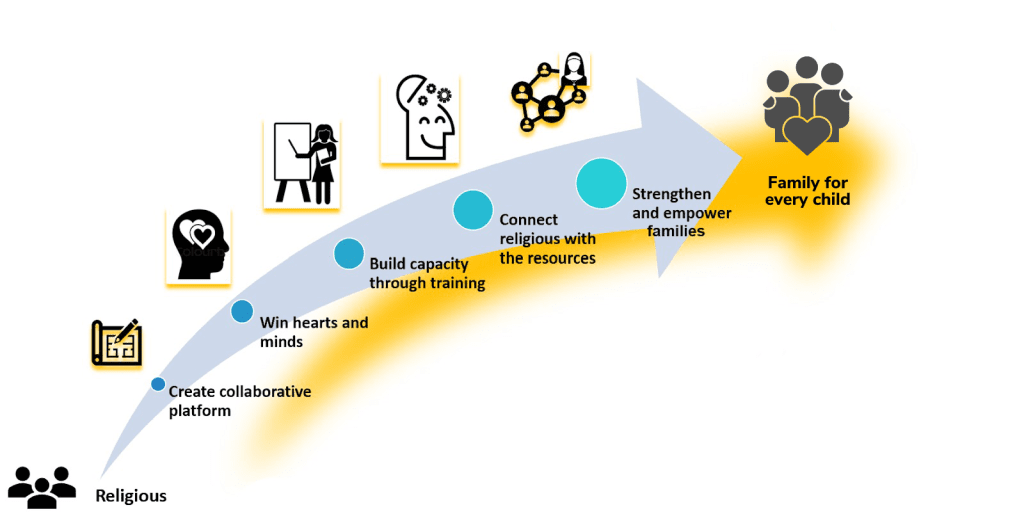Journey of Transformation
Catholic Sisters have responded over the centuries to God’s call to love and serve those in greatest need. Religious institutes were founded by women and men who looked to the signs of their times and addressed the profound needs they saw. Their responses—their charisms—are an enduring gift from the Spirit to a world in need of love, compassion, and justice.
The Spirit, at the source of all charisms in Christian life, is creative and transformative.
A charism of care
Religious institutes of Sisters have expressed their charisms in different ways based on changing needs in a changing world. In the past, Sisters with charisms of care often favored institutional approaches in caring for children. These include settings such as children’s homes, babies’ homes, and rehabilitation centers for children with disabilities.
With growing appreciation for the importance of family nurture for children’s well-being, many Sisters are moving toward family- and community-based care for children. This movement is in response to the millions of children worldwide who have been separated from their families for various reasons such as poverty or parental death. It may occur because parents, relatives, or neighbors are unable to provide proper care, which compromises the child’s development. Children with disabilities needing specialized care are especially at risk of family separation.
Reading the signs of the times
Sisters today are examining the signs of the times through the lens of faith, taking inspiration from the biblical mandate to care for people in need and by Catholic social teaching, especially the principles of the dignity of each person, the preferential option for the poor, and the right of each person to participate fully in family and community.
Sisters are delving into social science research that clearly documents the benefits of family life for children’s well-being and the risks associated with institutionalization. They are attentive to emerging international and national legal frameworks and policies that increasingly favor family- and community-based care over institutional care.
Recognizing that the child, for the full and harmonious development of his or her personality, should grow up in a family environment, in an atmosphere of happiness, love and understanding.”
Preamble, United Nations Convention on the Rights of the Child
Responding to the signs of the times: toward new models of care
Across the globe there are many inspiring examples of women and men religious whose ministries keep children in their families, connected to their communities, and out of institutions. Placing children and families at the center of care requires strengthening and protecting the family so that no family is forced to place a child in an institution because of poverty or lack of access to basic services.
Under their respective national conferences for religious women and men, religious with a charism of care in Uganda, Kenya and Zambia have come together, working collaboratively to reduce recourse to institutional care and to transition toward family- and community-based care for children. As the founding partners of Catholic Care for Children, they are committed family strengthening:
- If families are in distress, provide support to prevent separation of children from their families.
- If separation occurs, see that children are reunited with families or placed in a family-like environment.
- If emergency care is necessary, ensure that the care is of the highest quality and shortest duration possible.
- Large-scale residential care should always be a last resort.
Supported by Catholic Care for Children International, Sisters and religious institutes make a thorough assessment of their current capabilities and identify areas needing attention. They create and implement plans enabling them to pivot from institutional toward family-based care. They carefully measure and evaluate the results of their efforts, identifying best practices to carry forward and share with others who have a charism of child care.
Adopting new approaches to care reflects the Sisters’ intense commitment to child care reform. To make the transition, Catholic Care for Children partners are working collaboratively, drawing strength and inspiration from one another.
They have worked hard to “win hearts and minds,” so that Sisters and others—from government officials, to church leaders, local communities, and donors—realize how important it is for children to be in families and communities. Dozens of sisters have studied social work, working diligently to secure degrees while balancing studies, work, and community life. Sisters are using their new knowledge and skills to strengthen families and ensure that children have a supportive, loving family environment.

Hundreds of Sisters and co-workers have trained in child safeguarding and protection and in case management, including activities such family tracing, family reunification, recording keeping, and follow-up. These areas are vital to the child’s journey from institution to family.
The new care model also has called for new relationships. Religious institutes are with each other, connecting with church leaders, working with local officials, and engaging with national leaders.
Through Catholic Care for Children, well over 3,000 children are now living with families rather than in institutions.
